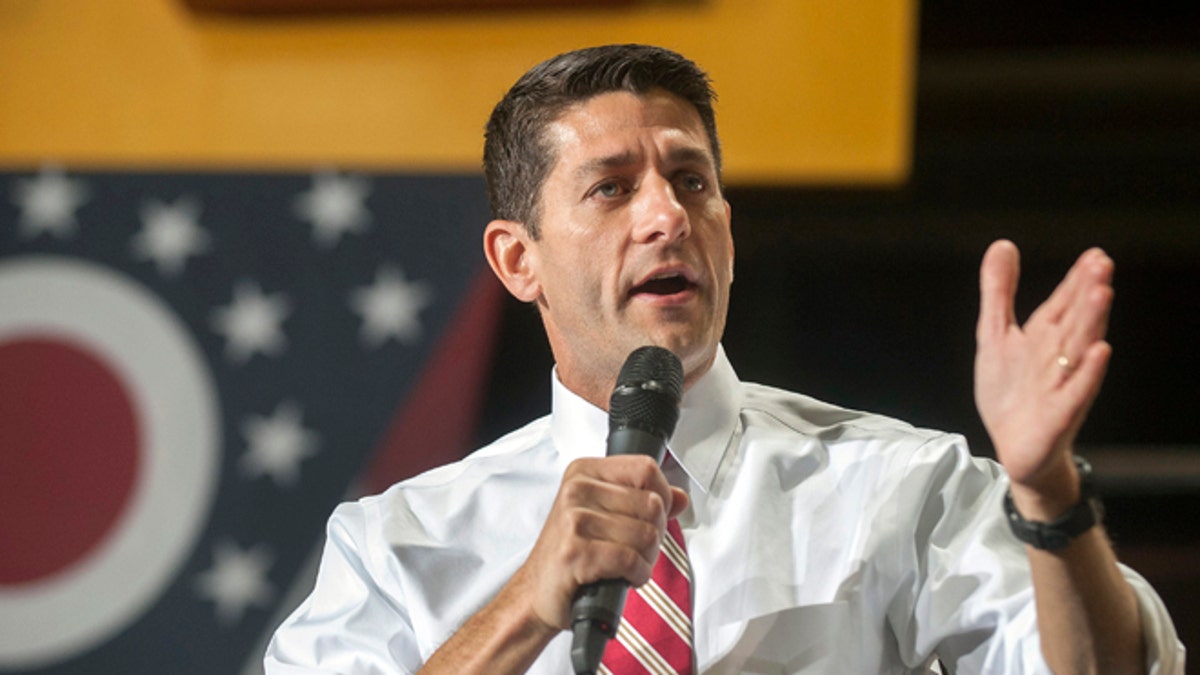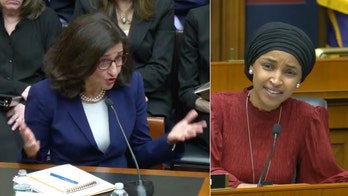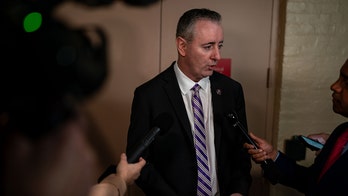
Saturday, Oct. 27, 2012: Republican vice presidential candidate Paul Ryan, R-Wis., speaks at a campaign event at the Gradall Industries plant in New Philadelphia, Ohio. (AP)
MADISON, Wis. – Rising political stars and personal friends, Republican vice presidential candidate Paul Ryan and Wisconsin Gov. Scott Walker worked quietly behind the scenes to coordinate public policy, avoid each other's limelight and steer clear of political minefields that would haunt their campaigns, according to more than 1,000 pages of internal emails obtained by The Associated Press. But there was at least one pointed snub between them, too.
Ryan and Walker, both in their early 40s, have made Wisconsin a focus of the political universe. In June, Walker became the first governor to defeat a high-profile recall election. Ryan, the congressman from Janesville, Wis., ascended the national political stage in August when Republican presidential nominee Mitt Romney picked him as his running mate. In the presidential race Wisconsin is a battleground state, one of a handful that will determine who moves in -- or stays in -- the White House.
The emails reviewed by the AP offered an unusual, behind-the-scenes glimpse of the interpersonal relationship between Ryan and Walker. Although as a congressman Ryan's emails are exempt from disclosure under the U.S. Freedom of Information Act, messages sent by Ryan or his aides to Walker or the governor's staff are subject to Wisconsin's open records law. The week after Ryan was tapped as Romney's vice presidential candidate, the AP requested all such emails since Walker was elected in November 2010. It received 1,037 pages of them late Friday.
The day after Walker won his recall election, Ryan tried to call Walker to congratulate him. Was there a better phone number?
"He has his cell, but not able to get through often," wrote Ryan's scheduler, Sarah Peer. In another message, she wrote: "Yeah, they call each other frequently. I think Paul just wants to speak with him right away, which might not be a possibly (sic) at this time."
The emails showed that aides to Ryan and Walker, both Republicans, coordinated closely at times on political issues on behalf of their bosses. As Wisconsin's health services secretary, Dennis Smith, prepared to testify during a congressional hearing in January 2011 about the costs to states under President Barack Obama's health care law, Walker sent a preview of Smith's remarks to Ryan, the chairman of the House Budget Committee and an outspoken opponent of the health care law.
"Good stuff," wrote Conor Sweeney, the committee's communications director. "Any chance you could hit the impact on Wisconsin families and Wisconsin's budget from Medicaid expansions?"
Walker's then-communications director, Chris Schrimpf, said he would forward the request to Smith's chief of staff to revise the testimony.
The emails also show how Ryan and Walker sought to steer clear of sensitive political traps, and how Ryan was sensitive as early as September 2011 about offering any praise to government projects funded with money under Obama's economic stimulus law. In August, the AP and other news organizations noted that Ryan -- a vocal opponent of the stimulus law -- sought to steer money under the program to companies in his home state, which Ryan first awkwardly denied then acknowledged to be true.
In the emails, Walker's director of federal relations, Wendy Riemann, sent a message to Ryan's aide, Kevin Seifert, to describe a new grant from the U.S. Veterans Affairs Department awarded for a local water project. Riemann asked whether Ryan wanted to be quoted in a press release praising the money being spent in Wisconsin.
"Not to create more work for you, but do you have any idea where the money for this grant came from? Was it stimulus/the American Recovery and Reinvestment Act?" Seifert replied. "Our concern is that, if it's stimulus funds, we won't want to highlight (and would think you guys wouldn't, either) .... We generally don't do press on things we actively oppose."
Riemann responded that she would check the source of the money, which turned out not to be stimulus funding. "Feel free to proceed without us on this one," Seifert wrote.
Sometimes, the rising political stars inadvertently overshadowed each other. Greta Van Susteren in July 2011 cancelled a television appearance by Walker on her Fox News cable program to instead interview Ryan about the debt ceiling.
"Did you mess with my trip scheduling for tomorrow?" Riemann asked Seifert. She included a smiley in her email, suggesting she wasn't genuinely upset.
"If I did I'm really sorry and had no idea that's what they were doing," Seifert replied. "They didn't mention Gov. Walker was on the schedule ... Had they even mentioned that you guys had something set, I wouldn't have done that ... You know me, that's not my style."
Sometimes, the powerful politicians handled mundane requests, too. Seifert emailed Walker's staff about a "random request from Laura Ingraham," noting that the conservative radio talk show host had contacted him and needed help hiring a new executive producer. But he made clear what he thought of Ingraham's request: "We've got a million other more pressing priorities," he wrote.
The emails included at least one embarrassing snub by Ryan. Riemann, from the governor's office, emailed the congressman's office to ask for help coordinating a tour of the U.S. Capitol for Walker's wife, Tonette, who expected to travel to Washington. Such tours are known as dome tours. Ryan's staff said he was too busy to accommodate the request.
"Sorry, Paul doesn't do dome tours," Ryan's scheduler wrote back. "He never has, so sorry we can't be of assistance there."




